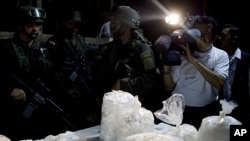Tuesday is the U.N.’s International Day against Drug Abuse and Illicit Trafficking aimed at raising awareness of the major problem that illegal drugs represent to society.
The U.N. Office on Drugs and Crime (UNODC) estimates that nearly 200 million people use illicit drugs such as cocaine, cannabis, hallucinogens, opiates and sedative hypnotics worldwide.
Dr. Arthur Kennedy of the University of Cape Coast in Ghana, authored the book The Drug Invasion of West Africa.
He said West Africa has become an ideal place for drug trafficking and warned, if African countries do not act quickly to deal with the drug menace, global powers may have to act in a manner that could undermine the sovereignty and dignity of African countries.
“It is very serious for a number of reasons. First, you know that there has been a war between the Mexican government and the drug cartel and, as the Mexican government gains ascendance in that war, the cartels are refocusing on Europe, using West Africa as a transit point,” he said.
Kennedy said West Africa will continue to be a vulnerable region as a transit point for the drug trade because of its long and poorly protected coastline, weak governments, poverty and strategic location between South America and Europe.
Kennedy said despite efforts by some West African countries to deal with the illicit drug menace, often with the help of the West, the tide of drugs in the region continues to rise.
He urged West African countries to deal with the region’s drug problem and the challenges it poses.
“I think that West African countries should strengthen their navies. I think that they should share more intelligence information so that drug vessels that escape from one jurisdiction can be tracked in another jurisdiction,” Kennedy said.
Kennedy also called on West African countries to strengthen their laws on money laundering because, he said, weak money-laundering laws encourage criminal enterprises and attract illegal monies.
He said, with the help of the West, West African countries should raise the incomes of their populations through the creation of well-paying jobs.
“When young men and women have no jobs to do, getting involved with drug cartels become very attractive to them,” he said.
Kennedy also called for strengthening law-enforcement institutions in West Africa, especially police, so as to prevent them from falling prey to drug cartel bribery.
“I think that we should pay our law-enforcement officials better than we do now. They should have more equipment; there should be more accountability; and then we should have strict conflict of interest guidelines so that people cannot play both sides when they are exercising discretion,” Kennedy said.
The U.N. Office on Drugs and Crime (UNODC) estimates that nearly 200 million people use illicit drugs such as cocaine, cannabis, hallucinogens, opiates and sedative hypnotics worldwide.
Dr. Arthur Kennedy of the University of Cape Coast in Ghana, authored the book The Drug Invasion of West Africa.
He said West Africa has become an ideal place for drug trafficking and warned, if African countries do not act quickly to deal with the drug menace, global powers may have to act in a manner that could undermine the sovereignty and dignity of African countries.
“It is very serious for a number of reasons. First, you know that there has been a war between the Mexican government and the drug cartel and, as the Mexican government gains ascendance in that war, the cartels are refocusing on Europe, using West Africa as a transit point,” he said.
Kennedy said West Africa will continue to be a vulnerable region as a transit point for the drug trade because of its long and poorly protected coastline, weak governments, poverty and strategic location between South America and Europe.
Kennedy said despite efforts by some West African countries to deal with the illicit drug menace, often with the help of the West, the tide of drugs in the region continues to rise.
He urged West African countries to deal with the region’s drug problem and the challenges it poses.
“I think that West African countries should strengthen their navies. I think that they should share more intelligence information so that drug vessels that escape from one jurisdiction can be tracked in another jurisdiction,” Kennedy said.
Kennedy also called on West African countries to strengthen their laws on money laundering because, he said, weak money-laundering laws encourage criminal enterprises and attract illegal monies.
He said, with the help of the West, West African countries should raise the incomes of their populations through the creation of well-paying jobs.
“When young men and women have no jobs to do, getting involved with drug cartels become very attractive to them,” he said.
Kennedy also called for strengthening law-enforcement institutions in West Africa, especially police, so as to prevent them from falling prey to drug cartel bribery.
“I think that we should pay our law-enforcement officials better than we do now. They should have more equipment; there should be more accountability; and then we should have strict conflict of interest guidelines so that people cannot play both sides when they are exercising discretion,” Kennedy said.






